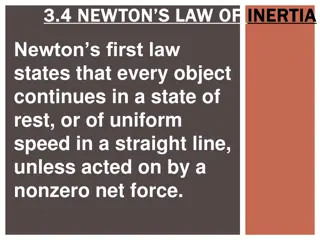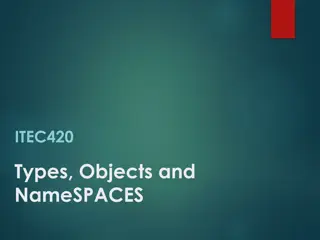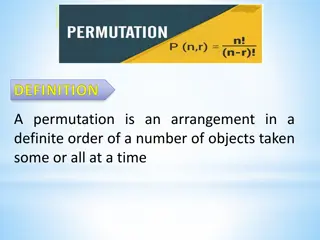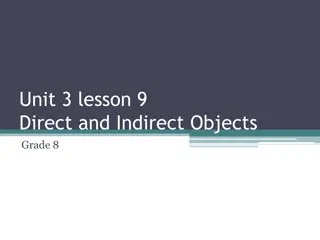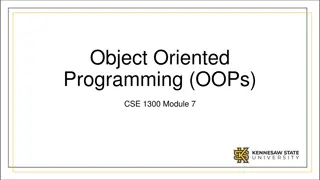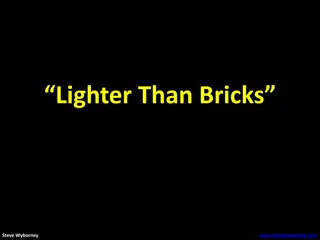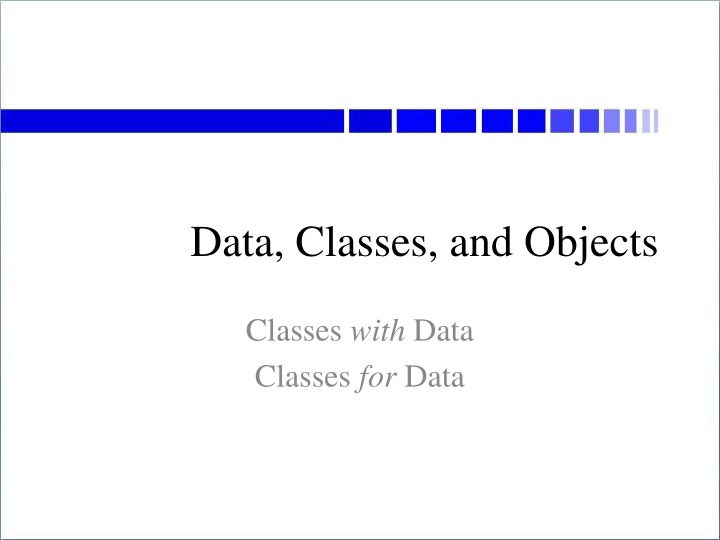
Classes and Objects in Java Programming
Learn about classes, objects, and data manipulation in Java programming. Explore topics such as returning multiple values from methods, creating custom data types, and interacting with objects to achieve programming goals.
Download Presentation

Please find below an Image/Link to download the presentation.
The content on the website is provided AS IS for your information and personal use only. It may not be sold, licensed, or shared on other websites without obtaining consent from the author. If you encounter any issues during the download, it is possible that the publisher has removed the file from their server.
You are allowed to download the files provided on this website for personal or commercial use, subject to the condition that they are used lawfully. All files are the property of their respective owners.
The content on the website is provided AS IS for your information and personal use only. It may not be sold, licensed, or shared on other websites without obtaining consent from the author.
E N D
Presentation Transcript
Data, Classes, and Objects Classes with Data Classes for Data
Outline Returning multiple values from a method Introduction to objects and data types Creating our own data types instance variables constructors getters setters instance constants
Rectangle Area Program Used methods to get dimensions, calculate area and print introduction and report printIntroduction(); height = getDimension("height"); width = getDimension("width"); area = calculateArea(height, width); printReport(height, width, area); Need two methods to read the values can t return two values from one method
Dimensions of a Rectangle The length and width are of a rectangle two pieces of information about one thing Nice if we could do this: printIntroduction(); rectangle = getDimensions(); area = calculateArea(rectangle); printReport(rectangle, area); Variable rectangle holds height and width but what would its data type be? not double that s just one number! // but HOW?!?
Objects and Data Types Java allows us to create objects objects hold multiple pieces of information we could make a Rectangle object it could hold a height and a width Rectangle rectangle; double area; printIntroduction(); rectangle = getRectangle(); area = calculateArea(rectangle); printReport(rectangle, area);
Exercise Consider the following code: Rectangle rectangle; double area; printIntroduction(); rectangle = getRectangle(); area = calculateArea(rectangle); What is the return type of calculateArea? What type is calculateArea expecting to be given? that is, what is its argument or parameter type? What is the return type of getRectangle?
Object Oriented Programming Programming arranged around objects main program creates the objects objects hold the data objects call each others methods objects interact to achieve program goal Very important in GUI programs Graphical User Interface WIMP (Windows, Icons, Menus, Pointers) interface
What are Objects? An object in a program often represents a real- world object an animal, a vehicle, a person, a university, or some abstract object a colour, a shape, a species, or some thing the program needs to track a string, a window, a GUI button,
Object Classes = Data Types What kind of object it is its data type is a class String s1, s2; Scanner kbd, str; Rectangle r1, r2; Color c1, c2; JButton okButton, cancelButton; Object classes are data types you can create variables of that data type // s1 & s2 are Strings // kbd & str are Scanners // r1 and r2 are Rectangles // c1 & c2 are Colors // are JButtons To use Color & Button, you need to import java.awt.Color; import javax.swing.JButton;
Data Types vs. Programs Programs are classes public class ProgramNameGoesHere { programs have a main method public static void main(String[] args) { Data types are also classes public class DataClassNameGoesHere { data classes have no main method (usually) if it doeshave a main method, it s to test the data class Scanner, String, Color, etc. are not programs you can t run them
Object Data Each class has its own kind of data Color has red, green, blue and alpha data orange has 255 R, 127 G, and 0 B (and 255 A) different Colors have different values c1 c2 red red 255 17 green green 127 179 blue blue 0 251 alpha alpha 255 255
Object Data Each class has its own kind of data a Rectangle would have height and width values short and wide squarish tall and skinny r1 height 0.32 width 2.21 r2 r3 height 0.63 height 4.96 width 0.71 width 0.08
Data in Classes Each piece of information in a class is called a field, or a property, or an instance variable I will typically use instance variable instance of a class = an object in that class Each instance variable has its own name red, green, blue, alpha height, width Different classes may use same names an Oval might have height and width, too
Creating Objects Most Java objects created using new usually with arguments arguments depend on the class kbd = new Scanner(System.in); c1 = new Color(255, 127, 0); r1 = new Rectangle(0.32, 2.21); okButton = new JButton("OK"); not Strings, tho s1 = "Strings are special!"; s2 = new String("But this works, too!"); // This is orange // short and wide Remember to import java.awt.Color; import javax.swing.JButton;
Constructors Every object created needs data a value for each instance variable Rectangle will need a height and a width r1 = new Rectangle(0.32, 2.21); r1 s height will be 0.32; its width will be 2.21 Some values may be left implicit c1 = new Color(255, 127, 0); c1 s red, green and blue are 255, 127 and 0 c1 s alpha is 255 (because usually want solid colours) The bit that comes after new is called a Constructor; its job is to construct the object (fill in its instance variables)
Reading a Rectangles Dimensions Command in main is rectangle = getRectangle(); Method getRectangle: private static Rectangle getRectangle() { Scanner kbd = new Scanner(System.in); double hgt, wid; Sop("Enter height and width: "); hgt = kbd.nextDouble(); wid = kbd.nextDouble(); kbd.nextLine(); return new Rectangle(hgt, wid); }
Working with Objects Can ask them about their information int r, g, b; r = c1.getRed(); g = c1.getGreen(); b = c1.getBlue(); c1 r red 255 255 g green 127 127 blue 0 b alpha 0 255 r1 h double h, w; h = r1.getHeight(); w = r1.getWidth(); 0.32 height 0.32 w width 2.21 2.21
Getters Methods that get information out of an object are called getters name usually starts with get (as in getRed) Method to calculate the area needs its height and width (we give it the Rectangle): private static double calculateArea(Rectangle r) { double area; area = r.getHeight() * r.getWidth(); return area; } Exercise: write printReport(rectangle, area)
Working with Objects We can tell them to change their information sometimes! okButton.setBackground(c1); cancelButton.setBackground(c2); cancelButton.setForeground(Color.yellow); NOTE: some instance variables are objects background of a JButton is a Color
Setters Methods that change information in an object are called setters name usually starts with set (as in setBackground) Maybe change size of Rectangle? r1.setHeight(1.5); r1.setWidth(2.5); r1 r1.setSize(1.0, 1.0); setSize sets both height and width height 0.32 1.5 1.0 width 2.21 2.5 1.0
Why Getters and Setters? Why not just use the names? h = r1.height; w = r1.width; r1.height = 1.5; r1.width = 2.5; r1.height = 1.0; r1.width = 1.0; What if someone does this? r1.width = -10.5; that s not a valid width! Warning: don t set things up this way!
Data Protection Some values make no sense negative height or width make no sense Setting fields to those values would be wrong a bug in your program Try to prevent that from happening make others ask to get/change values check if their changes make sense only change if the change makes sense Private data; public methods
Note on the Slides All of our classes have been programs so far now we start to write non-program classes In order to usethem, we need a program program asks non-program to do things so we need two (or more) files program class codewill be in dark blue data type class codewill be in dark orange
Creating the Rectangle Class Project has RectangleArea program right-click on package name in Projects pane New > Java Class NOT New > Java Main Class name the class Rectangle (capital R) new file Rectangle.java created public class Rectangle { }
Instance Variables Normal variable declarations, except: NOT inside any method (there are no methods) starts with word private one each for height and width: public class Rectangle { private double height; private double width; } private prevents height = -10.5; but also prevents h = r1.height;
Constructor A special kind of method name is same as name of class (Rectangle) no return type (not even void) uses arguments to set instance variables public class Rectangle { private double height; private double width; public Rectangle(double reqHgt, double reqWid) { height = reqHgt; weight = reqWid; } }
Fields vs. Parameters Note the different names: height and width are the fields (in green) reqHgt and reqWid are the parameters (in black) Different meanings! reqHgt and reqWid are the dimensions requested height and width are the dimensions saved these are what you use in your other methods usually the same but not always! Why might they be different?
Invalid Requests Client may request negative height or width r1 = new Rectangle(-5.1, -2.0); reqHgt is -5.1; reqWid is -2.0 we can t stop them from doing that! it is a mistake, but people make mistakes but we can refuse to save those values won t set height to -5.1; won t set width to -2.0 What to do? use 0 instead (and maybe print a warning message) throw an exception (we ll learn about this later)
Dealing with Invalid Requests Zero + error option: public Rectangle(double reqHgt, double reqWid) { if (reqHgt < 0.0) { Sopln("Illegal height for Rectangle: " + reqHgt); height = 0.0; } else { height = h; } // similarly for reqWid and width }
Getters VERY simple: just return the requested value public double getHeight() { return height; } note: public, but NOT static return height (NOT reqHgt) no parameters: you don t need to tell the Rectangle its width or height; it already knows them! no reading from the user!!! Exercise: write getWidth
Setters Pretty simple: check the value, and if it s good, use it otherwise: complain or throw an exception public void setHeight(double reqHgt) { if (reqHgt >= 0.0) { height = reqHgt; } else { Sopln("Illegal height for Rectangle: " + reqHgt); } } // if requested value is OK // use requested value Exercise: write setWidth
Program and Type Together Our program that reads the dimensions of and then calculates the area of a Rectangle should be in the same package as our Rectangle class so we don t need to import it We can put it in a different package and import it from that package if those two packages are in the same project otherwise it s a pain to do in NetBeans
A Larger Example A class for holding student information student number name home address grades ... We ll start simple: number, name, one grade (in percent) these are called the properties of the Student stu number A00123456 name Dent, Stu pctGrade 81
Creating Data Class in NetBeans Create the project as usual Java application, naming the program Create a Java class NOT a Java main class! Open file and look inside class definition it should be empty (no main method) public class Student { }
Student Data Student class needs variables to hold the data for each student number is String(!), name is String, grade is int These variables called instance variables each Student object an instance of Student class each Student object has its own variables Stu Dent s A# and grade different from A. Tudiant s
Student Class (Start) public class Student { private String aNumber; private String name; private int pctGrade; } instance variables are declared private (not public) no static ; no final methods will be declared below // A00... // family name, givens // 0..100
Public vs. Private Public = anyone can use these public name anyone can change my name public grade anyone can change my grade public method anyone can call this method Private = only I can use them (*) private name only I can change my name private grade only I can change my grade private method only I can call this method (*) Actually, any Student can change my name/grade; other classes have to ask
Static vs. Not Static (Most) program methods are private and static private static double getArea(Rectangle r) { } main is public and static publicstatic void main(String[] args) { } (Most) data type methods are just public public double getHeight() { } not static For now just hold on to that! we ll explain why (and when not) next week
Declaring a Student Give A#, name and grade when create Student s1, s2; s1 = new Student("A00123456", "Dent, Stu", 81); s2 = new Student("A00234567", "Tudiaunt, A.", 78); or can combine the steps: Student s3 = new Student("A00111111", "No, Dan", 0); arguments are String (aNumber), String (name), and int (percent grade)
Student Constructor Constructor builds the Student object gives a value to each of the instance variables private String aNumber; // A00 private String name; private int grade; public Student(String a, String n, int g) { aNumber = a; name = n; grade = g; } // Last, First // 0 .. 100 a, n, and g are the parameters: the values the caller wants to use; aNumber, name, and grade are the instance variables: the values we will use.
Constructors Generally declared public anyone can build a Scanner, a Student, Name is exactly the same as the class name class Student constructor named Student class Animal constructor named Animal No return type not even void! Argument for each instance variable (often)
Constructors Their job is to give a value to each instance variable in the class and so often just a list of assignment commands instanceVariable = parameter; aNumber = a; name = n; grade = g; But may want to check if values make sense so maybe a list of if-else controls
Checking Values If requested value makes no sense, use default (if there s a good one) or throw exception public Student(String a, String n, int g) { aNumber = a; name = n; if (0 <= g && g <= 100) { grade = g; // use valid grade } else { Sopln("Illegal grade: " + g); grade = 0; // replace invalid grade } } // check if grade is valid
Exercise Add code to the constructor so that aNumbers must start with "A" and be 9 characters long otherwise, set aNumber to "ILLEGAL!!!"
So Now Weve Savedthis Info We want to be able to ask about it maybe even change it But the instance variables are private can t change them directly: Student stu = new Student("A00000000", "Dent, Stu", 100); stu.name = "Dummikins, Dummy"; can t even ask about them! System.out.println(stu.aNumber); name is private in Student! aNumber is private in Student!
Methods to Get Information Getters usually named get + name of instance variable but capitalized in camelCase System.out.println(stu.getName()); returns stu s name System.out.println(stu.getANumber()); returns stu s A number System.out.println(stu.getPctGrade()); returns stu s percentage grade
Student Getters These getters are very simple! just return the instance variable method return type same as type of variable private String aNumber; // A00 private String name; public String getName() { return name; } public String getANumber() { return aNumber; } // Last, First public! Not static! Anyone can ask! This is a data type!
Exercise Write the getter for the percent grade recall: private int grade; // 0 .. 100 did you check to see if the grade was valid? hint: you shouldn t have! why not?
Sample Client Code Student record tester reads & prints student records until user types Q Scanner kbd = new Scanner(System.in); Student stu; String num, name; int pct; System.out.print("Enter student s A-# (or Q to quit): "); num = kbd.nextLine(); ...
Sample Client Code (continued) while (!num.startsWith("Q")) { // read student info System.out.print("Enter student name: "); name = kbd.nextLine(); System.out.print("Enter percent grade: "); pct = kbd.nextInt(); kbd.nextLine(); // create and print student information stu = new Student(num, name, pct); System.out.println("\n" + stu.getANumber() + " (" + stu.getName() + ") got " + stu.getPctGrade() + "%"); // get next student s number System.out.print("Enter student s A-# (or Q to quit): "); num = kbd.nextLine(); }

![[PDF⚡READ❤ONLINE] Tutankhamun's Trumpet: Ancient Egypt in 100 Objects from the](/thumb/20549/pdf-read-online-tutankhamun-s-trumpet-ancient-egypt-in-100-objects-from-the.jpg)

